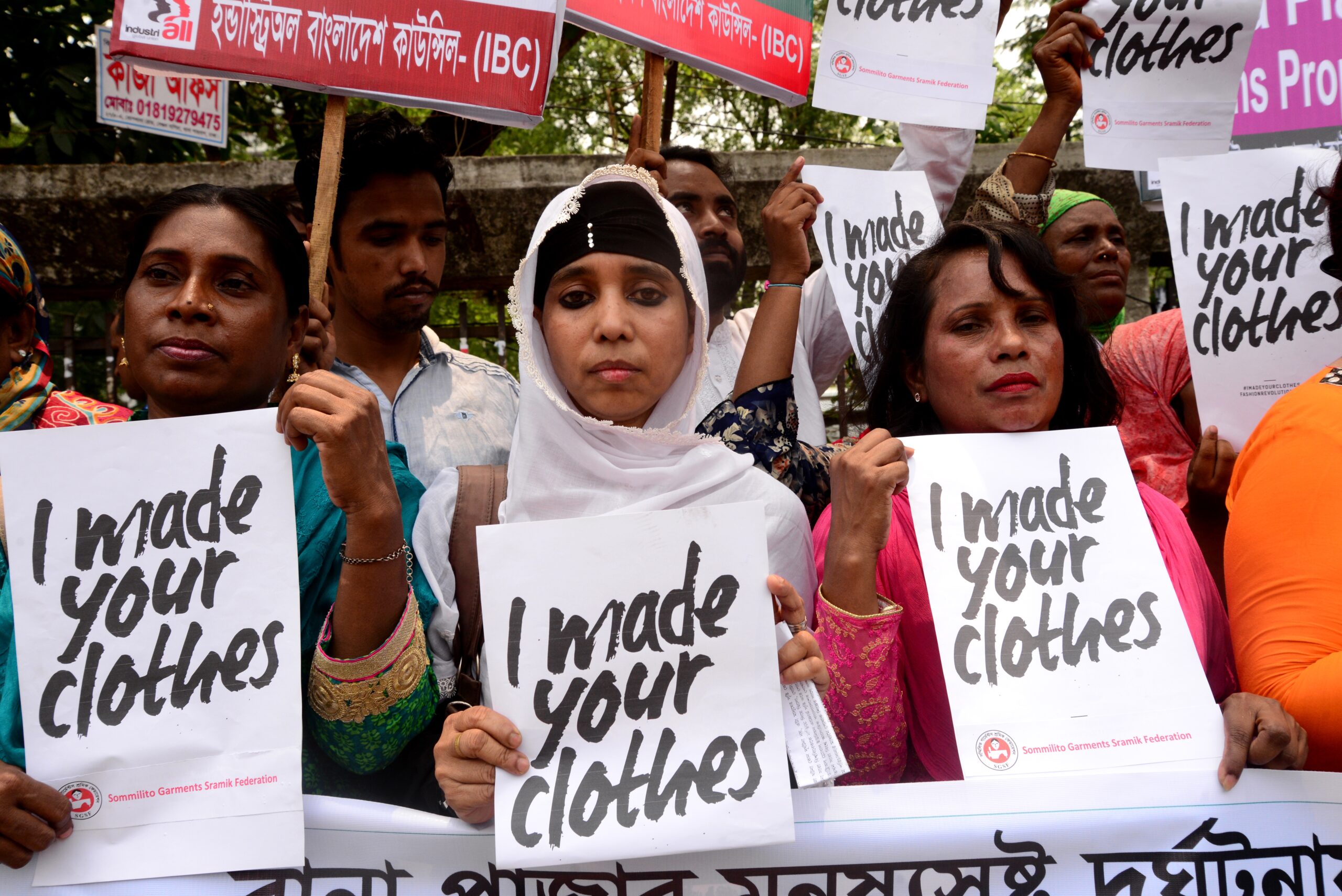A decade after Rana Plaza’s collapse, factories are safer but women garment workers face new threats
This Q&A was republished from a Fuller Project newsletter

(Photo by Mamunur Rashid/NurPhoto/Getty Images)
Rana Plaza, an industrial high-rise building on the outskirts of Bangladesh’s capital Dhaka, collapsed 10 years ago today. The building housed several garment factories manufacturing clothes for brands like Mango and Benetton. Over 1,100 workers were killed, most of them young women. It remains the deadliest industrial disaster of the 21st century.
A number of initiatives sprang up in the aftermath of the collapse intended to support garment workers. But 10 years on, Nazma Akter, one of Bangladesh’s most prominent labor organizers, says the outlook is still bleak for the women who make the world’s clothes — they might not be dying in collapsing or burning factories, but they’re malnourished and being pushed out of the industry by automation.
We spoke to Akter, a former child worker in the garment industry, about the legacy of Rana Plaza. The interview has been translated from Bangla and edited for length and clarity.
It’s been 10 years since Rana Plaza collapsed. What’s changed for garment workers since?
Nothing. Some safety improvements. I don’t see anything else.
You can’t be serious?
Look, when Rana Plaza collapsed our factories were very unsafe. In the mid-2000s there was another factory that had collapsed and killed dozens. Then there was a series of fire disasters. The most famous one is the Tazreen factory fire [in 2012, killing at least 117 people]. It was awful what we saw among the victims there, the charred flesh, it was horrifying.
Now, the legacy is that factories are safer. Workers aren’t staring death in the face like they used to. So we can say this is a gain.
And the number of unions being formed shot up as well. But their ability to advocate for workers hasn’t improved. Only a small number of garment workers are represented by unions, and many are created by garment factory owners themselves and are in their pockets.
After Rana Plaza, there was some hope that unions would give workers a voice. Instead, the number of unions is high in quantity but low in quality.
What does that mean for workers?
I’m mad because we get wages below the poverty level, our workers are going hungry, and brands are not paying anything close to what they should be paying.
Many, many of our workers are malnourished. Rice is 70 taka per kg ($0.70) — they get $75 a month. How much does 30 kg of rice cost to feed a family for a month? A chicken is $2.50, tilapia fish is $2. What will people eat? Eggs are more expensive too.
Our workers have their backs against the wall, they’re afraid to buy anything. They can’t afford to keep their kids in daycare centers, so they send them to stay with relatives in their home village — but then they have to send money back to the village. So are garment workers going to have to go without clothes in order to make ends meet?
So while there was a focus on safety after Rana Plaza, there was no real pressure to do anything about wages. Why do you think this was overlooked?
Brands come to us for cheap labor. When you think of a person as cheap labor, as a cheap person, in that space you’re not going to give them dignity, or respect.
So fair wages, fair prices, these things aren’t happening. Brands say they want this and that, but don’t give the money for it.
Our manufacturers’ hands are also tied because they have to be cheap. Our laws are work-friendly, not worker-friendly. The way global capital works is to make the rich richer and the poor poorer, and the brands are the ones who are most responsible.
Even for Rana Plaza victims, there’s been no compensation according to international standards for loss and damage, lost income, harm to family. All they got was a trust fund — the amount is such that even if thousands died garment factory owners wouldn’t feel anything. The workers didn’t get what was owed to them due to their rights as a worker, they just got some charity.
Despite the exploitation and safety issues, a lot has also been written about how the garment industry has also empowered women in the workplace in Bangladesh.
I started working in the garment industry when I was 12. My family was a big one. My father was a day laborer and my mother was a garment worker. The money they got wasn’t enough to run our family, so I had to start working.
When I was 14 or 15, a factory burned down and we organized a strike. I lost my job and was blacklisted, and people around me used to call me a bad woman with a bad character. People told me to speak softly since I’m a woman, my relatives would say I should stay quiet and try to earn money. But whatever people said, I tried to move forward, not backward. Now I’ve helped create many unions in factories where women are taking leadership roles.
Today, people talk about sewing machine operators getting promoted to line supervisors, things like that. But it’s nothing like what we’d like to see. There’s women in leadership, but the numbers are very low. Abuse and harassment has gone up after the pandemic, with all the mental health issues that arose during that time.
What does the future look like for women in the industry?
Because of automation, women now make up less than 60% of the workforce. That’s compared to 80%, 90% before. Now that machines do the work, the factories don’t need the low-skill labor that women used to do.
People think of automation as a man’s job. This is going to be a big challenge, to train women on this work. Women built the industry, but they’re not going to benefit from its future.
These are young women we’re talking about. And the way the industry works, it’s ok if these young women get destroyed as long as they output the work.















